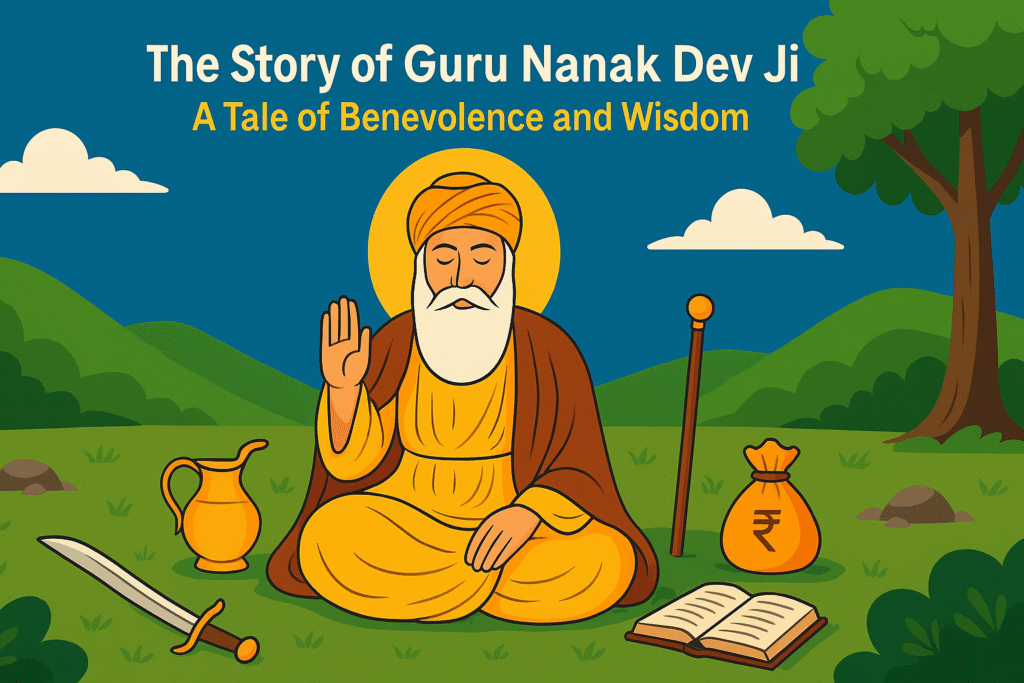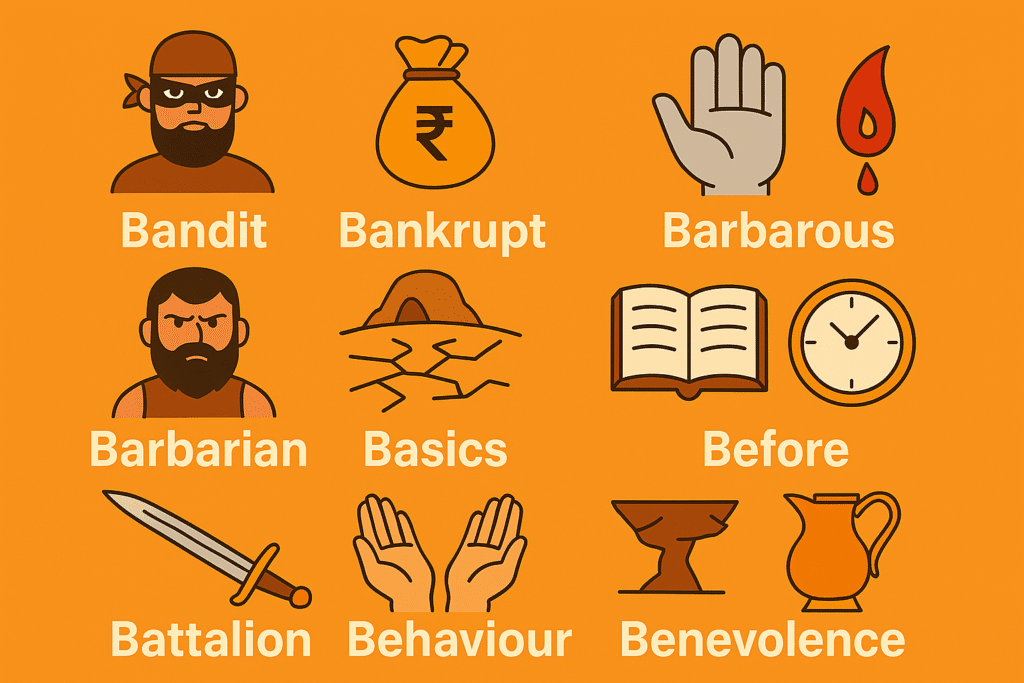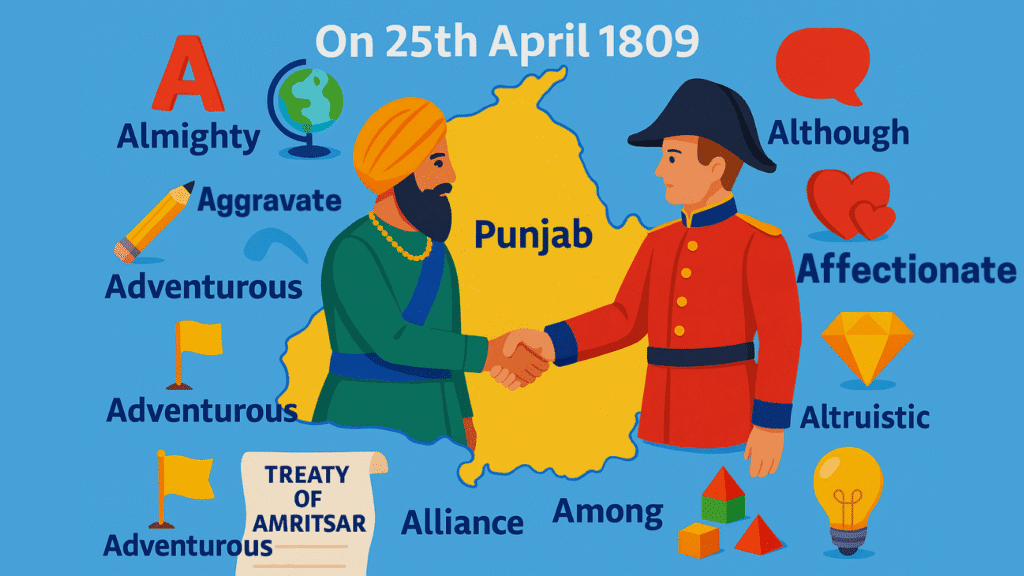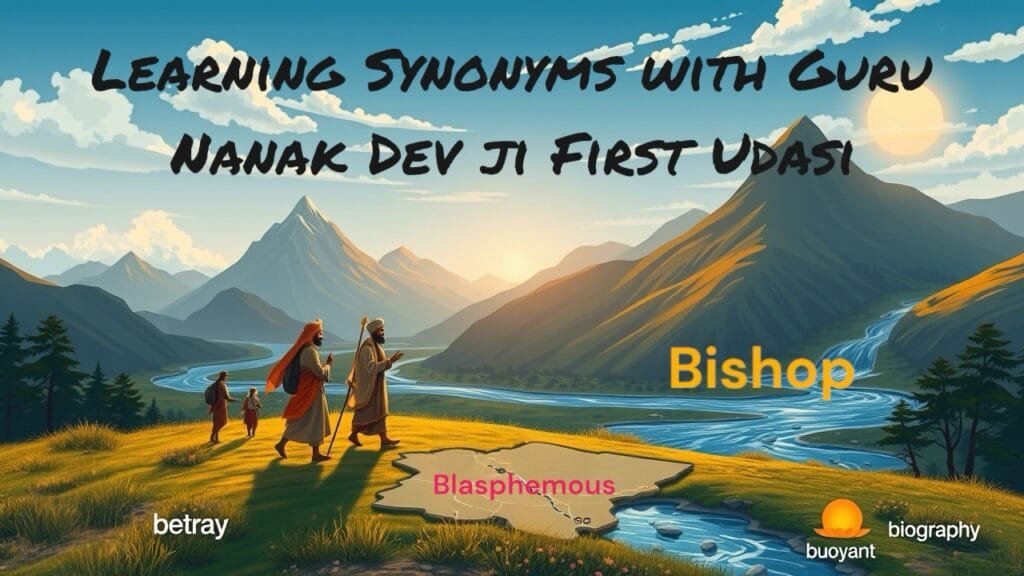
This is another installment in our ongoing series on synonyms for PSSSB, Punjab Patwari, PCS, Punjab Police, Excise Inspector, and other government exams. If you haven’t read the previous parts, make sure to click here and catch up before diving into Part 6 of this series.
In this part, we continue with our story-based approach to synonyms, helping you understand words contextually rather than just memorizing them. This method ensures that the meanings stay deeply ingrained in your brain’s neural network, making them easier to recall in the future. Plus, by actively using these words in daily life, you’ll strengthen your vocabulary naturally. So, let’s get started!
Table of Contents
The Story of Guru Nanak Dev Ji: A Tale of Benevolence and Wisdom with 10 synonyms

Guru Nanak Dev Ji, the founder of Sikhism and the first of the ten Sikh Gurus, was born on April 15, 1469, in the village of Talwandi, now known as Nankana Sahib, near Lahore in present-day Pakistan.
During the late 15th century, Punjab was a region often plagued by bandits(robbers or outlaws) who looted travelers and villagers, creating an atmosphere of fear and insecurity. Guru Nanak Dev Ji, during his extensive travels (known as Udasis), encountered such outlaws. Instead of fearing them, he preached the message of honesty, hard work, and the futility of violence. His teachings transformed many bandits(robbers or outlaws) into honest individuals, demonstrating the power of spiritual wisdom over brute force.
Guru Nanak Dev Ji’s father, Mehta Kalu, was a village accountant (patwari), a role that required a deep understanding of the basics(fundamental principles) of finance and administration. Despite being born into a financially stable family, Guru Nanak Dev Ji often emphasized that true wealth lies in spiritual richness, not material possessions. He criticized the exploitation of the poor by moneylenders, which often left farmers and laborers bankrupt(unable to pay their debts). His establishment of the institution of Langar (community kitchen) ensured that no one went hungry, regardless of their social or economic status. This practice of sharing and equality remains a cornerstone of Sikhism.
During his travels, Guru Nanak Dev Ji visited regions where people were often treated as barbarians(uncivilized or cruel people) due to their caste, creed, or social status. He vehemently opposed such discrimination, teaching that all humans are equal in the eyes of the Divine. His famous words, “Na koi Hindu, na koi Musalman” (There is no Hindu, no Muslim), underscored the futility of religious divisions and the importance of universal brotherhood. He also condemned barbarous(cruel or savage) practices like ritual sacrifices and the oppression of women, advocating for compassion and justice instead.
Guru Nanak Dev Ji’s teachings were like water to a barren(unproductive or lifeless) land, bringing life and hope to those who listened. He traveled to far-flung regions, including present-day India, Pakistan, Tibet, Sri Lanka, and the Middle East, spreading his message of love, equality, and devotion to God. His hymns, compiled in the Guru Granth Sahib, are a treasure trove of spiritual wisdom and practical guidance. He emphasized the importance of hard work (Kirat Karo), honest living (Vand Chhako), and remembering God (Naam Japo), which became the basics(fundamental principles) of Sikh philosophy.
One of the most significant events in Guru Nanak Dev Ji’s life was his visit to Saidpur (now Eminabad in Pakistan) during Babur’s invasion. The town was ravaged by Babur’s battalion(a large group of soldiers), and the people were left in despair. Guru Nanak Dev Ji not only comforted the survivors but also fearlessly confronted Babur, condemning the cruelty of his army. This incident is recorded in his hymns, where he describes the suffering caused by the invasion and the need for compassion even in times of war.
Guru Nanak Dev Ji’s behaviour(way of acting) was a reflection of his deep spiritual wisdom and unwavering commitment to truth. From a young age, he displayed a unique inclination toward spirituality, often questioning societal norms and rituals. His famous encounter with the Kaliyug (the age of darkness) symbolized his mission to eradicate ignorance and superstition. He taught that true benevolence(kindness and goodwill) lies in selfless service to humanity, a principle that continues to inspire millions.
Before Guru Nanak Dev Ji’s time, society was deeply divided, and spiritual practices were often reduced to empty rituals. He revolutionized the religious landscape by emphasizing the importance of inner devotion over outward displays of piety. His teachings laid the foundation for a society based on equality, justice, and compassion, principles that remain relevant even today.
Here’s the detailed explanation of each word with meanings in English and Punjabi, along with example sentences to help you understand their usage contextually.

1. Bandit (ਲੁਟੇਰਾ, ਡਾਕੂ)
Meaning: A criminal, especially one who robs people, usually as part of a group.
ਅਰਥ: ਅਪਰਾਧੀ, ਖਾਸ ਕਰਕੇ ਉਹ ਜੋ ਲੋਕਾਂ ਨੂੰ ਲੁੱਟਦਾ ਹੋਵੇ।
Example:
The bandit escaped into the forest after robbing the bank.
ਲੁਟੇਰਾ ਬੈਂਕ ਨੂੰ ਲੁੱਟਣ ਤੋਂ ਬਾਅਦ ਜੰਗਲ ਵਿੱਚ ਭੱਜ ਗਿਆ।
2. Bankrupt (ਦਿਵਾਲੀਆ, ਮੌਲਤੋੜ)
Meaning: A person or business that has lost all its money and is unable to pay debts.
ਅਰਥ: ਇੱਕ ਵਿਅਕਤੀ ਜਾਂ ਵਪਾਰ ਜੋ ਪੂਰੀ ਤਰ੍ਹਾਂ ਪੈਸਾ ਗਵਾ ਬੈਠਾ ਹੋਵੇ ਅਤੇ ਕਰਜ਼ਾ ਚੁਕਾਉਣ ਯੋਗ ਨਾ ਹੋਵੇ।
Example:
After making bad investments, he went bankrupt.
ਗਲਤ ਨਿਵੇਸ਼ ਕਰਨ ਕਾਰਨ ਉਹ ਦਿਵਾਲੀਆ ਹੋ ਗਿਆ।
3. Barbarian (ਅਣਸੱਭਿਆ, ਜੰਗਲੀ)
Meaning: A person who is uncivilized, cruel, or behaves in a wild manner.
ਅਰਥ: ਅਜਿਹਾ ਵਿਅਕਤੀ ਜੋ ਬੇਰਹਿਮ, ਅਣਸੱਭਿਆ ਜਾਂ ਜੰਗਲੀ ਹੋਵੇ।
Example:
The ancient barbarians attacked the village without mercy.
ਪ੍ਰਾਚੀਨ ਅਣਸੱਭਿਆ ਲੋਕਾਂ ਨੇ ਪਿੰਡ ‘ਤੇ ਬੇਰਹਿਮੀ ਨਾਲ ਹਮਲਾ ਕੀਤਾ।
4. Barbarous (ਕਠੋਰ, ਬੇਰਹਿਮ, ਨਿਰਦਈ)
Meaning: Extremely cruel, harsh, or lacking civilization.
ਅਰਥ: ਬਹੁਤ ਜ਼ਿਆਦਾ ਬੇਰਹਿਮ, ਨਿਰਦਈ ਜਾਂ ਅਣਸੱਭਿਆ।
Example:
The dictator’s rule was barbarous and full of fear.
ਅਧਿਕਾਰਸ਼ਾਹੀ ਦੀ ਕਠੋਰ ਸ਼ਾਸਨਵਿਧੀ ਡਰ ਅਤੇ ਹਿੰਸਾ ਨਾਲ ਭਰੀ ਹੋਈ ਸੀ।
5. Barren (ਬੰਝ, ਨਿਸਫਲ, ਵਿਰਾਨ)
Meaning: Land that cannot produce crops or a person who is unable to have children. It can also mean something that lacks results.
ਅਰਥ: ਅਜਿਹੀ ਜ਼ਮੀਨ ਜੋ ਉਗਾਉਯੋਗ ਨਾ ਹੋਵੇ ਜਾਂ ਅਜਿਹੀ ਹਾਲਤ ਜਿਸ ਵਿੱਚ ਨਤੀਜਾ ਨਾ ਨਿਕਲੇ।
Example:
The barren land could not support any farming.
ਬੰਝ ਜ਼ਮੀਨ ‘ਤੇ ਕਿਸਾਨੀ ਨਹੀਂ ਹੋ ਸਕਦੀ।
6. Basics (ਮੁੱਢਲੀ ਜਾਣਕਾਰੀ, ਬੁਨਿਆਦੀ ਚੀਜ਼ਾਂ)
Meaning: The most important and simple parts of something.
ਅਰਥ: ਕਿਸੇ ਵੀ ਚੀਜ਼ ਦੀ ਸਭ ਤੋਂ ਮੁੱਢਲੀ ਅਤੇ ਆਮ ਜਾਣਕਾਰੀ।
Example:
Before learning advanced math, you must understand the basics.
ਉੱਚ ਗਣਿਤ ਸਿੱਖਣ ਤੋਂ ਪਹਿਲਾਂ ਬੁਨਿਆਦੀ ਗਿਣਤੀ ਆਉਣੀ ਚਾਹੀਦੀ ਹੈ।
7. Battalion (ਸੈਨਾ ਟੁਕੜੀ, ਫੌਜ ਦਾ ਸਮੂਹ)
Meaning: A large group of soldiers in an army.
ਅਰਥ: ਫੌਜ ਦੀ ਇੱਕ ਵੱਡੀ ਟੁਕੜੀ।
Example:
A battalion of soldiers was sent to protect the border.
ਸਰਹੱਦ ਦੀ ਰਾਖੀ ਲਈ ਫੌਜੀ ਟੁਕੜੀ ਭੇਜੀ ਗਈ।
8. Before (ਪਹਿਲਾਂ, ਪੂਰਵ)
Meaning: Earlier in time, or in front of something.
ਅਰਥ: ਪਹਿਲਾਂ ਜਾਂ ਕਿਸੇ ਚੀਜ਼ ਦੇ ਸਾਹਮਣੇ।
Example:
Finish your homework before going out to play.
ਖੇਡਣ ਤੋਂ ਪਹਿਲਾਂ ਆਪਣਾ ਗ੍ਰਿਹ-ਕੰਮ ਮੁਕੰਮਲ ਕਰੋ।
9. Behaviour (ਚਾਲ-ਚਲਣ, ਵਰਤਾਓ)
Meaning: The way someone acts or conducts themselves.
ਅਰਥ: ਕਿਸੇ ਵਿਅਕਤੀ ਦਾ ਰਵੱਈਆ ਜਾਂ ਚਾਲ-ਚਲਣ।
Example:
His behaviour towards elders is always respectful.
ਉਹ ਬਜ਼ੁਰਗਾਂ ਨਾਲ hamesha ਵਧੀਆ ਵਰਤਾਓ ਕਰਦਾ ਹੈ।
10. Benevolence (ਦਇਆ, ਭਲਾਈ, ਪਰਉਪਕਾਰ)
Meaning: Kindness and willingness to help others.
ਅਰਥ: ਦਇਆ ਅਤੇ ਦੂਜਿਆਂ ਦੀ ਮਦਦ ਕਰਨ ਦੀ ਇੱਛਾ।
Example:
The king was known for his benevolence towards the poor.
ਉਹ ਰਾਜਾ ਗਰੀਬਾਂ ਪ੍ਰਤੀ ਦਇਆ ਲਈ ਜਾਣਿਆ ਜਾਂਦਾ ਸੀ।
Frequently Asked Questions (FAQs)
Q1: Why is learning synonyms important for PSSSB, Punjab Patwari, and other government exams?
A: Synonyms help improve your vocabulary, comprehension, and writing skills, which are essential for scoring well in English and Punjabi language sections of exams like PSSSB, PCS, Punjab Police, and Patwari.
Q2: How can I memorize synonyms effectively for competitive exams?
A: The best way is to learn them in context using story-based learning, practice tests, and daily usage. Also, writing sentences with new words can help reinforce your memory.
Q3: Are these synonyms useful for PCS and Punjab Patwari exams?
A: Yes, the listed synonyms are frequently asked in exams like PCS, Punjab Patwari, Excise Inspector, Punjab Police, and PSSSB. Mastering them can give you an edge over other candidates.
Q4: How can I improve my English vocabulary for government job exams?
A: Read newspapers, competitive exam books, and online resources. Practice mock tests and revise words regularly to retain them for the long term.
Q5: Will using these synonyms help in essay and letter writing for PCS exams?
A: Absolutely! Using rich vocabulary and precise synonyms makes your essays and letters more impactful and professional, improving your chances of scoring higher marks.
Q6: How often should I revise these synonyms?
A: Revise them daily for a week, then once a week for a month to make them part of your long-term memory. Try using them in conversations and writing for better retention.



















